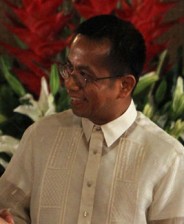Gov’t execs admit economic growth not enough to reduce poverty

Arsenio Balisacan of NEDA. INQUIRER FILE PHOTO
MANILA, Philippines — The economy is growing, but who’s enjoying it?
President Aquino’s financial managers painted a generally rosy picture of the economy as the House of Representatives formally began deliberations Wednesday on the proposed national budget for next year.
But an overarching theme in presentations made by the Development Budget Coordination Committee (DBCC) was the need to ensure “inclusive growth” through projects outlined in the Aquino administration’s national expenditure program.
“Economic growth is necessary but not sufficient for poverty reduction,” Director-General Arsenio Balisacan Jr. of the National Economic and Development Authority told the House committee on appropriations.
“We need to do more to attain inclusive growth. Not only do we need to accelerate infrastructure development and enhance our development in human capital, we also need to give importance to the sectoral and geographical dimensions to ensure that our growth strategy benefits the greatest number of our people,” he added.
Article continues after this advertisementBalisacan said the country was “on track with respect to our economic targets, particularly in achieving rapid growth.” The government’s growth target is set at 6.5 to 7.5 percent next year.
Article continues after this advertisementStill, “the present challenge is to improve the social indicators particularly on job creation and poverty reduction,” the NEDA chief said.
“Social service and protection need to be better targeted to ensure that the marginalized sectors are still able to enjoy the basic goods and services they need to live decent lives,” he added.
Budget Secretary Florencio Abad cited four key strategies to help reduce poverty.
He mentioned the move to expand the conditional cash transfer program, which would now cover 4.44 million households and 10.2 million children. The CCT allocation was increased from P44 billion this year to P62.6 billion in the 2014 budget.
Another strategy calls for access to “quality education and universal health care, and provision for socialized housing.”
Abad described the new budget as “performance-based,” allowing Congress to hold different government agencies “accountable” in terms of how their respective allocations would be spent.
“Dati puro kwenta lang nakikita sa budget, ngayon nilagyan namin ng kwento,” he told congressmen.
He said the new budget removes the need for special allotment release orders because an allocation would now be considered released when the budget is approved.